Vitamins are essential nutrients found in small amounts in food and drinks, crucial for good health. While they don’t provide energy like carbs, proteins, and fats, vitamins play indispensable roles in various bodily functions. But which vitamins are most important? And what vitamins are essential?


Each vitamin has a specific function in maintaining good health. Some are vital for energy production, others support the immune system, some are essential for a well-functioning nervous system, and others aid in cell damage repair. In essence, getting sufficient amounts of each vitamin is crucial for these vital functions. Conversely, excessive vitamin intake, often through supplements, can be harmful.
In this blog, we delve into the different types of vitamins, their functions, how vitamin deficiencies occur, symptoms of deficiencies, and ways to prevent them. In short, there’s a lot to know about these essential compounds. Keep reading for more.
What is the function of different vitamins?
Our bodies often inadequately produce vitamins, necessitating consumption of foods containing these essential nutrients. Exceptions include vitamin K, produced in small amounts in the intestines, and vitamin D, produced in the skin under sunlight influence. Vitamin A can also be stored in significant quantities.
All vitamins fall into two categories:
- Fat-soluble
- Water-soluble vitamins
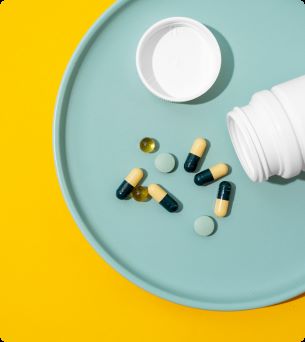
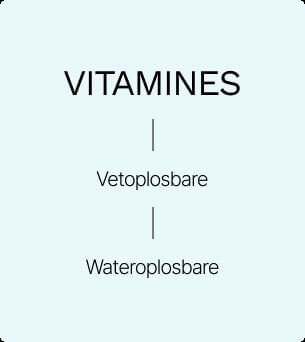
Below a list of all vitamins and their specific roles in maintaining good health.
Fat-soluble vitamins
Fat-soluble vitamins are primarily obtained from foods rich in fat and can be stored in limited amounts in the body.
Vitamin A:
Essential for eye health, immune function, and maintaining healthy skin. Found in foods like meat, fish, dairy, eggs, carrots, and green leafy vegetables. Unlike most other vitamins, a significant reserve of vitamin A can be stored in the liver.



Vitamin D:
Crucial for strong bones, teeth, muscles, and immune function. Found in fatty fish, meat, eggs, and products like margarine. Produced in the body under the influence of sufficient sunlight.
Vitamin E:
Functions as an antioxidant, protecting the body against harmful free radicals. Present in sunflower oil, nuts, seeds, and margarine.
Vitamin K:
Necessary for proper blood clotting and maintaining strong bones. Found in green leafy vegetables, cottage cheese, cheese, meat, and eggs. Gut bacteria can also produce vitamin K.
Water-Soluble Vitamins
Water-soluble vitamins dissolve in water and cannot be stored significantly in the body; any excess is excreted. Due to limited storage capacity, it is essential to regularly consume these vitamins through food:

Vitamin C:
An important antioxidant supporting the immune system, primarily found in fruits and vegetables.
Vitamin B1 (Thiamine):
Critical for releasing energy from food and functioning of the heart, nervous system, and brain. Found in grain products, bread, meat, vegetables, and dairy products.
Vitamin B2 (Riboflavin):
Essential for energy production and maintaining healthy skin. Present in milk and dairy products, meat, vegetables, fruits, and grain products.
Vitamin B3 (Niacin):
Plays a role in energy production, maintaining healthy skin, and functioning of the nervous system. Found in meat, fish, whole grain products, potatoes, and vegetables.
Vitamin B5 (Pantothenic Acid):
Assists in releasing energy from food, present in meat, eggs, whole grain products, legumes, and dairy products.
Vitamin B6 (Pyridoxine):
Important for the synthesis and breakdown of amino acids, regulating certain hormones, and maintaining a healthy nervous system. Found in meat, fish, nuts, bread, grains, vegetables, and dairy products.




Vitamin B8 (Biotin):
Essential for energy production, healthy skin, and hair. Found in eggs, liver, nuts, and milk.
Vitamin B11 (Folate):
Contributes to growth, proper body functioning, and reduces the risk of birth defects. Mainly present in green vegetables, whole grain products, meat, and dairy products.
Vitamin B12 (Cobalamin):
Necessary for the production of red blood cells and a healthy nervous system. Found in meat, fish, eggs, and dairy products.


Vitamin deficiency
When there is a shortage of vitamins in the body, it is referred to as a vitamin deficiency or, in medical terms, a vitamin deficiency. Vitamin deficiencies are rare in the Netherlands.
Certain groups are at an increased risk of vitamin deficiency, such as:
- Elderly individuals
- Veiled individuals
- People with a dark complexion
- Those who spend minimal time outdoors
- Vegans
- Pregnant women
- Young children
- Individuals with a highly unbalanced diet
They are advised to use supplements.

While vitamin deficiencies are generally rare in the Netherlands, they can cause serious health problems if left untreated.
There are various causes for the development of a vitamin deficiency:
Insufficient intake:
One of the most common and logical causes of vitamin deficiencies is insufficient intake of vitamins through diet. Eating a one-sided diet, lacking variety in meals, or deliberately avoiding certain foods can lead to a vitamin deficiency.
Disrupted nutrient absorption (malabsorption):
Certain conditions, such as celiac disease, Crohn’s disease, or post certain abdominal surgeries, can impede the absorption of vitamins by the intestines. This hinders the body from absorbing all the necessary vitamins, even if they are present in the diet.
Medication use:
Certain medications, such as antacids and antibiotics, can affect the absorption of vitamins.



Alcohol abuse:
Excessive alcohol consumption can result in vitamin deficiencies.
Limited exposure to sunlight:
People who receive little sunlight on their skin, for example, due to limited outdoor activities or veiling, are at risk of vitamin D deficiency. Additionally, seniors and children up to 3 years old are advised to take extra vitamin D.
The consequences of vitamin deficiency
Fortunately, vitamin deficiencies are rare among healthy individuals in the Netherlands. However, specific conditions or situations may increase the risk of deficiencies. For these groups, it is recommended to take supplements to prevent such deficiencies. Examples include young children, the elderly, pregnant women, individuals with dark skin, vegans, or those following an extremely one-sided diet. Additionally, individuals with specific conditions, such as digestive disorders, are advised to take specific supplements, always following their doctor’s guidance.


The severity of a vitamin deficiency is determined by various factors, including the specific vitamin lacking, the extent of the deficiency, and its duration. The consequences of a vitamin deficiency can have both short-term and long-term effects on your health.
Symptoms of vitamin deficiency
- A deficiency in vitamin B1 (thiamine) is more common among alcoholics and can result in psychological and neurological issues.
- A shortage of vitamin B2 (riboflavin) may cause skin problems around the mouth and tongue.
- Vitamin B3 (niacin) deficiency is almost nonexistent.
- A deficiency in vitamin B5 (pantothenic acid) is extremely rare and can lead to nervous system problems.
- A shortage of vitamin B6 is rare but may result in anemia or reduced immunity.
- Deficiency in vitamin B8 (biotin) is also uncommon but may lead to anemia, depression, and skin issues.
- A deficit in vitamin B11 (folate) can cause anemia in adults. In an unborn child, a shortage increases the risk of congenital defects such as spina bifida or cleft lip.
- A lack of vitamin B12 is more prevalent among vegans and can cause anemia and neurological symptoms. To check your vitamin B12 levels, consider Easly’s at-home vitamin B12 test. Vegans and vegetarians are also at a higher risk of deficiencies in other minerals, and Easly offers a deficiency blood test designed for them, measuring all these values.


- A deficiency in vitamin C can lead to scurvy, although this condition is now extremely rare.
- A vitamin D deficiency is more common and may result in weakened bones, an increased risk of fractures, and osteoporosis. Curious about your vitamin D levels? Easily check with the at-home vitamin D test to ensure your levels are adequate.
- A shortage of vitamin E is almost unheard of, unless there is a severe absorption issue, which might lead to anemia, neurological symptoms, and muscle weakness.
- A deficiency in vitamin K may occur in adults on prolonged antibiotic use and is more common in newborns. A lack of vitamin K delays blood clotting, leading to potential bleeding.
Maintaining a varied diet, avoiding no food groups, and consuming adequate nutrition generally minimize the risk of vitamin deficiency. However, specific groups, as mentioned above, are more susceptible, and supplements are recommended for them.
Related tests
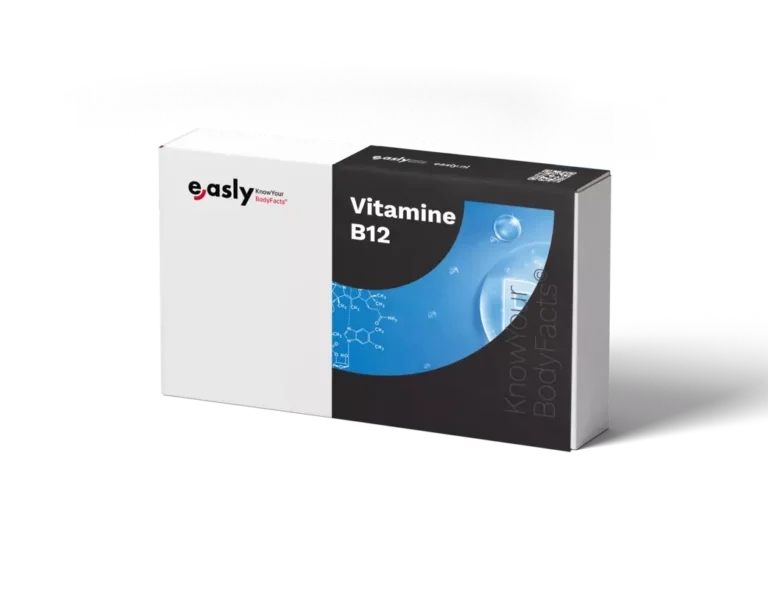
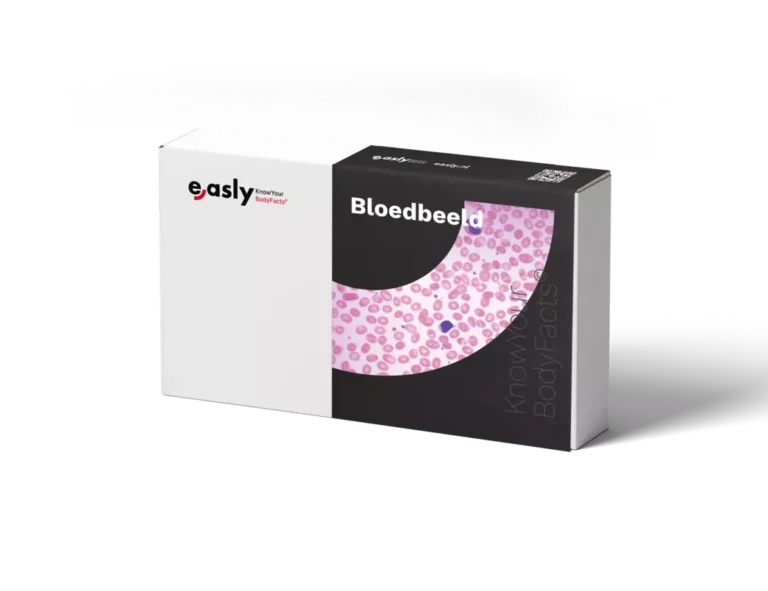
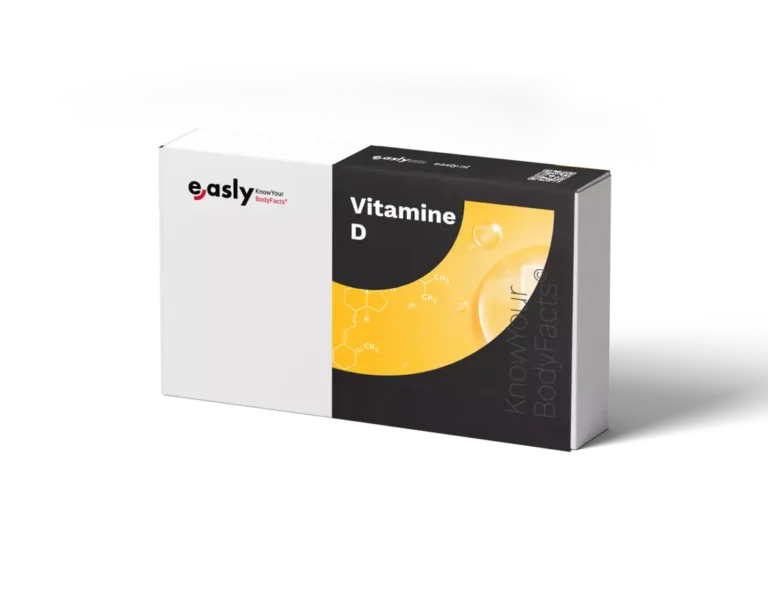
Important vitamins in specific situations
You now know that vitamin deficiencies are almost nonexistent if you maintain a varied diet. Certain vitamins become particularly crucial for specific groups. Below is a list of which specific vitamins are important in particular situations. We previously mentioned in which specific nutrients you can find these vitamins. It is important to note that you usually get enough of these vitamins by following a diverse diet, and it is not necessary to consume extra amounts of these vitamins in these specific situations.

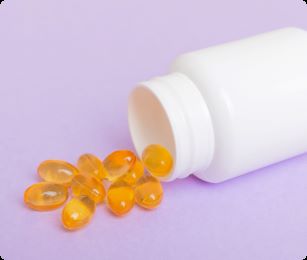


Vitamins for your immune system:
- Vitamin A
- Vitamin C
- Vitamin D
Vitamins for the elderly:
- Vitamin D: Especially important for the elderly to maintain bone health.
- Vitamin B12: Important for the health of the nervous system.
Vitamins for vegetarians and vegans:
- Vitamin B12: Primarily found in animal products. It is essential for vegans and vegetarians to consume alternative sources of vitamin B12 or take a supplemen
Vitamins for conceiving:
- Vitamin B11 (folate): Important for the baby’s development. A deficiency can lead to congenital abnormalities.
- Vitamin D: Important for the baby’s bone development.
Vitamins for healthy skin:
- Vitamin A
- Vitamin B2 (riboflavin)
- Vitamin B3 (niacin)
- Vitamin B8 (biotin)
Vitamins for athletes:
Most athletes do not require specific additional vitamins. By eating healthily and diversely, you obtain sufficient nutrients. Some intensive athletes, however, are advised to pay attention to the intake of specific nutrients. Read about which athletes those are in our blog on healthy sports nutrition.
Are you such an intensive athlete? At Easly, we offer the intensive athlete’s test, measuring these specific values through a reliable and straightforward blood test.
A home test especially for athletes. Provides insight into essential ...
Conclusion
In this blog, we discussed the crucial role of vitamins in our health. Vitamins are essential micronutrients that fulfill various functions in our bodies, ranging from supporting our immune system to maintaining strong bones and healthy skin. By eating a varied and balanced diet, without avoiding specific foods, the risk of a deficiency is very low. However, certain groups, such as the elderly, vegans, pregnant women, and individuals with specific conditions, face an increased risk and may benefit from taking supplements. If you experience symptoms, we always recommend scheduling an appointment with your own (family) doctor. The likelihood of these symptoms being caused by a vitamin deficiency is very small, emphasizing the importance of taking a comprehensive approach to address your complaints.









